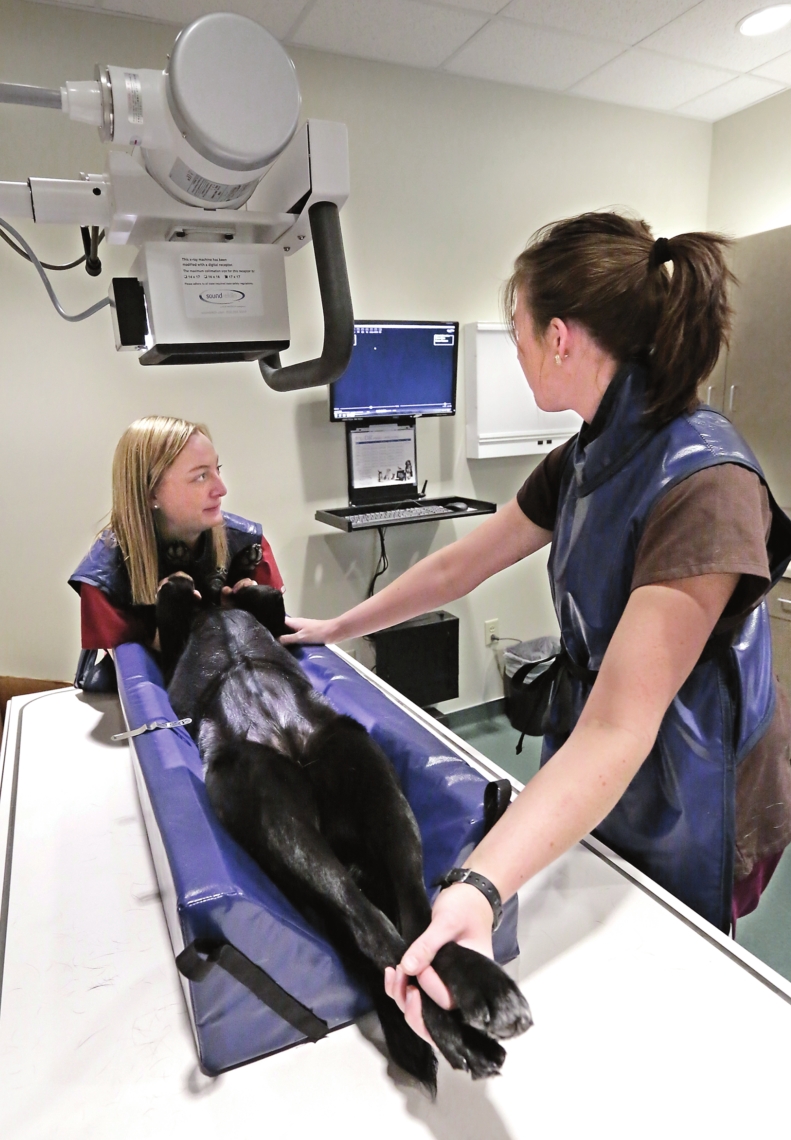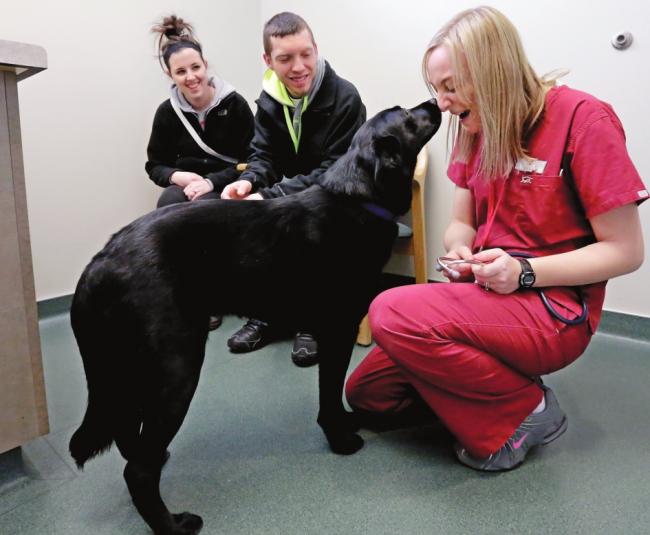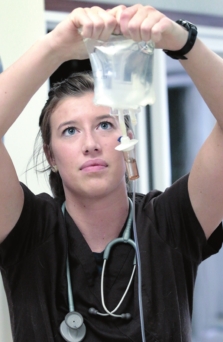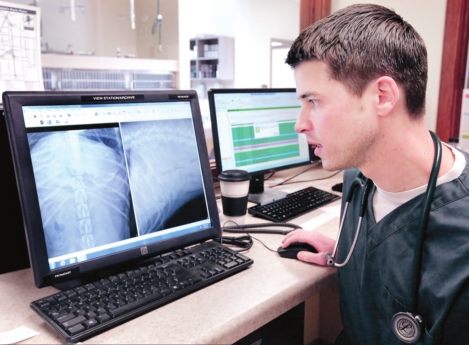
Veterinary Emergency Service keeps tails wagging
JANESVILLE
On a recent Friday, while her owners were preparing to go on vacation, Ruby the dog decided it would be an excellent idea to eat two pounds of ground coffee.
“Bad dog,” certainly. “Dangerously ill dog,” definitely. “Labs will eat anything,” said Dr. Chris Reagh of the Veterinary Emergency Service, 3710 E. Racine St., Janesville.
That’s where Ruby ended up spending the weekend, getting intravenous fluids, activated charcoal and other treatments.
 By Saturday afternoon, he was feeling well enough to demand attention from staff and visitors.
By Saturday afternoon, he was feeling well enough to demand attention from staff and visitors.
Reagh Veterinary Emergency Service of Janesville opened its doors in November 2013.
The clinic doesn’t offer vaccines, spay or neutering services or other routine care, only emergency care and more specialized surgeries.
For pet owners, the clinic offers a reassuring alternative when their regular veterinarians are not open—those panicked moments in the middle of the night or on weekends when they realize their best friends are really sick or injured.
For referring veterinarians, the clinic allows them to devote themselves to general practice veterinary care while at the same time freeing them from on-call weekends and evenings.
Off-hours illness
On the Saturday that Ruby was recovering from coffee grounds, Rylee, a Lab mix, was being examined for a possible intestinal blockage or other serious illness. She had been listless and lethargic for a few days, wasn’t eating and had started throwing up.
 Her owners, Alex and Thyra Fosmoen, were worried.
Her owners, Alex and Thyra Fosmoen, were worried.
“We got her at the humane society a couple of months ago,” Thyra said. “She’s such as sweetheart. We really love her.”
While Reagh talked to the Fosmoens, Rylee took refuge under the examining room chairs, looking anxiously out at her surroundings.
A few weeks ago, Alex said, Rylee had chewed up and swallowed a tennis ball. It made it through her system. Was it possible a piece was still stuck in there?
Reagh knelt down to palpate the dog’s stomach.
When he leaned in to listen more closely to the dog’s heart, Rylee licked his nose.
Meeting needs
Dr.
David Wirth started Veterinary Emergency Service with two separate
customer groups in mind. The obvious users were pet owners. But just as
important were the referring veterinarians.
“Dr.
Wirth really saw a niche market,” said Mary Kaminski, hospital
administrator for the business’ three locations. “As a veterinarian,
there is so much frustration in not having a place to send a pet when
the office is closed.”
Like
doctors who treat humans, veterinarians must be available nights and
weekends. But because most clinics are small, some veterinarians form
local cooperatives to share the burden of on-call time.
 But those cooperatives don’t address the issues of working alone or who will provide care for an animal that needs monitoring.
But those cooperatives don’t address the issues of working alone or who will provide care for an animal that needs monitoring.
Another challenge of offering emergency services is having the space to do it.
Most vets are primary care doctors, handling routine illnesses and crises along with vaccines and check-ups. When that’s the bread and butter of your
business, it’s difficult to justify adding space for specialty
equipment.
And like medical care for humans, veterinary care has specialists such as emergency doctors, oncologists and surgeons.
They function best when they have dedicated space and equipment.
“We know where our expertise is,” Kaminski said.
“Our doctors want to do emergency medicine.”
Space and specialties
Space also helps reduce the patients’ stress.
Rylee went with Reagh into the treatment area, worried but dutiful.
The
treatment area is ringed with treatment rooms and offices enclosed in
glass. In the center is a tech’s station, a drug cabinet with a
fingerprint-recognition lock and plenty of floor space. Panicky cats can
be kept well away from boisterous dogs.
Ruby, who was in a crate-like enclosure, got up, stuck her nose in the bars and started to bark cheerfully at the newcomer.
Two techs, bundled up in full-length lead aprons, took Rylee into the X-ray room.
Rylee was placed inside a long, tube-like cushion so the tech could take a photo of her abdomen.
 The
x-rays are digital, so Reagh was able to look at the results
immediately. On the screen next to Rylee’s x-rays was an image of Ruby’s
intestines, full of activated charcoal and coffee grounds.
The
x-rays are digital, so Reagh was able to look at the results
immediately. On the screen next to Rylee’s x-rays was an image of Ruby’s
intestines, full of activated charcoal and coffee grounds.
Certain
areas of Rylee’s intestines looked inflamed, and it’s possible she had
the dog version of gastritis, something that could be treated easily.
But there were other areas of concern, and Reagh wanted to e-mail the
x-rays to a veterinary radiologist.
Meanwhile, he decided to give Rylee fluids under the skin, a standard practice for dehydrated animals.
New markets
Kaminiski said the company entered the local market carefully.
About
three years ago, local veterinarians asked Wirth to consider a clinic
here. Veterinary Emergency Service also has clinics in Madison and
Middleton.
Although the economy was still recovering, pet owners were continuing to spend money in ever-increasing amounts.
Like medical care for humans, veterinary care has specialists such as emergency doctors, oncologists and surgeons.
The Janesville location serves an area from South Beloit to Milton, and most business comes from referring veterinarians.
The clinic is open weekends and from 5 p.m. to 8 a.m. during the week, and business has been brisk.
As for local vets, “they’re loving it,” Wirth said.
“We have people who say, ‘Thanks for being here,’” Wirth said.
Good dog
Reagh
told Rylee’s concerned owners to keep her on a bland diet. He could
recommend a specialty food or they could fix their own. Small amounts of
rice, chicken with no bones and cottage cheese might make their pooch
feel better.
“Time is a diagnostic test, too,” Reagh said.
Reagh then gave Rylee a spoonful of the specialty food, just to see if she was interested.
She was. Rylee and her owners went home with the rest of the can, something to help her keep food down and plenty of advice.
About a week later, Thyra Fosmoen reported that Rylee was back to her normal self.
“She’s such a good dog,” she said.